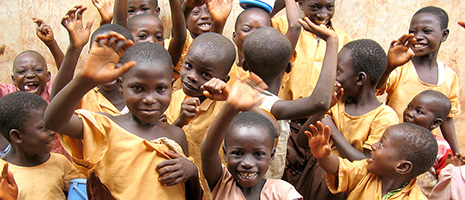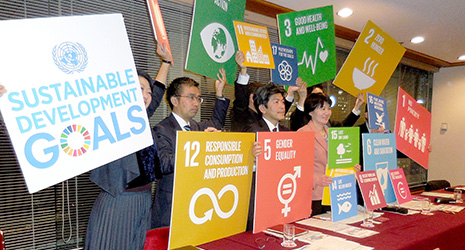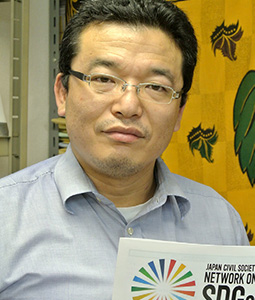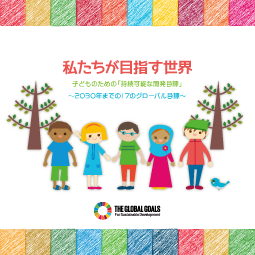Home > Highlighting JAPAN > Highlighting Japan September 2017 > SDGs: Challenges and Opportunities
Highlighting JAPAN


Civil Society “Transforming Our World
Civil Society in Japan is pursuing activities aimed at achieving Sustainable Development Goals (SDGs).
In Japan, initiatives are being undertaken by a large number of NPOs and NGOs in a variety of fields such as international cooperation, welfare, environmental protection and education. These NPOs and NGOs have become particularly active in the initiatives aimed at achieving SDGs in response to “Transforming our world: the 2030 Agenda for Sustainable Development” (also known as the 2030 Agenda) adopted by the United Nations General Assembly in September 2015.
For example, Action against Child Exploitation (ACE), a non-profit organization addressing the issues of child labor around the world, aims to achieve the goal to end child labor in all its forms by 2025. Projects are currently underway to protect children from being engaged in hazardous labor in the cocoa farms in Ghana and the cotton farms in India and to support their admission to schools.
Furthermore, the Japan National Assembly of Disabled Peoples’ International (DPI-JAPAN), an NPO established as a network of people with disabilities, promotes activities both in Japan and abroad with the aim of achieving equal access for disabled people to employment and educational opportunities. Its global initiatives include activities aimed at assisting disabled people in Africa to encourage their efforts to develop self-sustainability as well as developing leadership among them.
Founded as a civil society platform in April 2016, SDGs Japan has been assisting with these activities undertaken by NGOs and NPOs in Japan. This organization has as many as 100 members represented by NPOs and NGOs in Japan, addressing issues in a range of fields including sustainable development, health and medical care, disaster prevention and environmental protection.
Masaki Inaba, the chair of SDGs Japan, says, “Our organization serves as a civil society network comprised of NPOs and NGOs with the aim of achieving SDGs after many years of achievements that have been made in their respective fields. We also serve as a ‘catalyst,’ promoting stronger cooperation or partnership among NPOs and NGOs as well as between government organizations and private sector companies.”
One of the activities of SDGs Japan is to make recommendations on government policies, which are usually undertaken as part of the activities at the SDGs Promotion Round Table Meetings established by the government. This round table has been established as a subordinate body under the SDGs Promotion Headquarters chaired by Prime Minister Shinzo Abe and composed of all ministers. It serves as a platform for a multi-stakeholder dialogue for SDGs, involving members representing various ministries, NPOs, NGOs, international institutions and academia. The SDGs Promotion Headquarters adopted the SDGs Implementation Guiding Principles in December 2016 based on the discussions conducted by the round table meetings. The principles embrace a vision that states, “Become a leader toward a future where economic, social and environmental improvements are attained in an integrated, sustainable and resilient manner while leaving no one behind” and are comprised of principles toward the achievement of SDGs for Japan, priority areas and an implementation framework.
“We have succeeded in having our opinions reflected in the principles by becoming actively involved in the process of working them out. It is necessary to create an environment for NPOs and NGOs to be able to work with ease in order to achieve SDGs. For this reason, it is vitally important for us to make recommendations on government policy,” Inaba says.
SDGs Japan remains focused on activities in the international arena. As part of its international activities, SDGs Japan participated in the 2017 session of the United Nations High-level Political Forum on Sustainable Development (HLPF) held in New York this past July, a central platform for the follow-up and review of the 2030 Agenda participated in by government representatives from around the world, as well as representatives of stakeholders including NPOs, NGOs and private sector companies.
As a side event at the HLPF, SDGs Japan cohosted with an African NGO a symposium entitled “Cooperation between Africa and East Asia for SDGs and Agenda 2063: Lessons from TICAD.” At this symposium, participants delivered speeches and held discussions about contributions that can be made to achieve SDGs and the Agenda 20631 on the strength of the Tokyo International Conference on African Development (TICAD) initiatives driven by the Japanese government, or by civil society in Japan and Africa.
SDGs Japan has been taking active steps to publicize its activities related to SDGs by hosting a variety of events and dispatching lecturers to workshops around the country. In January of this year, SDGs Japan published the Japanese version of a handbook for youth entitled, “The World We Want: SDGs for Children,” which can be easily downloaded from the Internet in cooperation with eight Japanese NGOs including Save the Children Japan.
Says Inaba, “Sustainable society cannot be achieved without citizens’ power. Going forward, we aim to cultivate a better understanding of SDGs among citizens in collaboration with the regional NPOs across Japan.”
Japan will host major international conferences in 2019, including TICAD VII and G20. SDGs Japan will accelerate its activities in a variety of fields toward 2019.
1: The African Union’s (AU) Agenda 2063 action plan was formed at the Organization of African Unity (OAU) 50th anniversary celebration (OAU was established in 1963). It is a strategic framework for the socio-economic transformation of the African continent over the next 50 years, adopted by the AU’s general assembly in January 2015. The Agenda 2063 calls for strategic initiatives in an extensive range of fields including poverty eradication, educational reforms, the promotion of innovations, economic reforms, and agricultural modernization.
© 2009 Cabinet Office, Government of Japan








